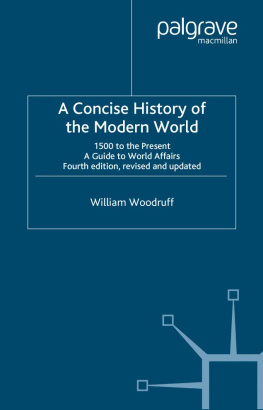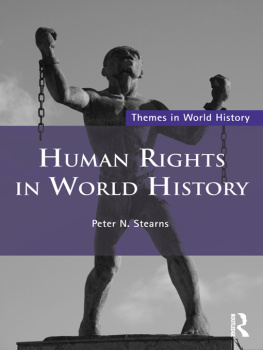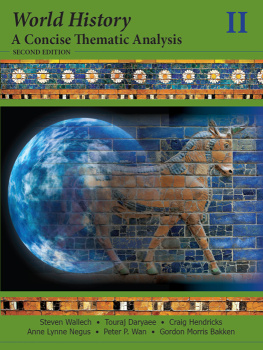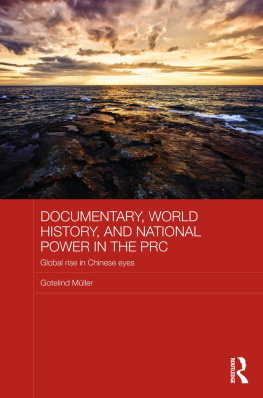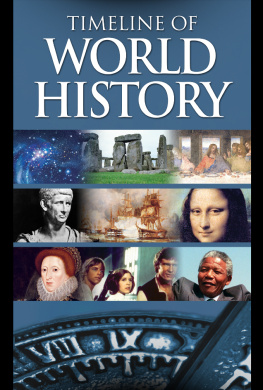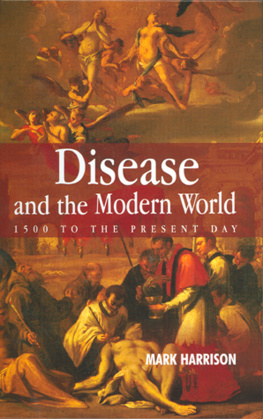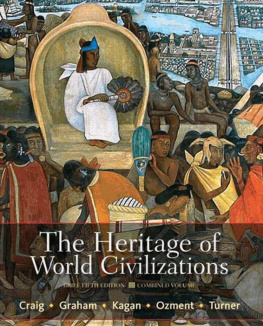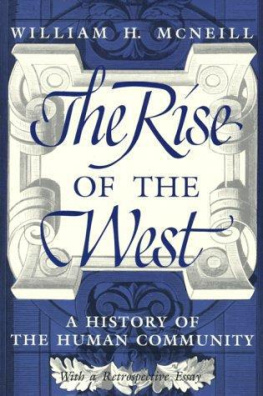Preface to the Fourth Edition
This overview of world history since AD 1500, with its underlying theme of shifting global power, tells in short compass how the modern world has come to be what it is.
In emphasizing the study of humanity as a whole, this volume continues the work I began in Impact of Western Man in 1966. It was then that the words of the English poet John Donne, 'No man is an island entire of itself, every man is part of the main', came to have special significance for me. In seeking to understand the totality, complexity and diversity of the past, my focus shifted from the parts to the whole, from the trees to the forest. My concern became the relation between states rather than within states. While not denying the uniqueness of national or regional history, or the sub-specialisms that have proliferated these past fifty years, I felt that the growing communality and interdependence of nations justified my taking the wider, more pluralistic view. To sharpen the focus of this ecumenical study, I have also adopted a topical as well as a chronological approach.
To provide insights into five hundred years of world history and put them into compact form has not been easy. No matter how much one tries to avoid it, some items will invariably be given more, some less, attention than they deserve; the tendency will be to present history as much more unidirectional and continuous than events in the real world confirm. In sifting the wheat from the chaff, I have followed the maxim of Voltaire: 'Les details qui ne menent a rien sont dans l'histoire ce que sont les bagages dans une armee, impedimenta; il faut voir les choses en grand.' (Meaningless details in history are like the baggage of an army: impedimenta; one must take the wider view.) Details are not ends in themselves.
The greatest hazard confronting a writer engaged in a task of this kind lies not in the breadth of the subject, or in its complexity, but in the point of view from which he tells his tale. I know of no historical writing of lasting value that does not reveal the man behind the pen. Of necessity, my views are personal, temporal and locational.
Whatever the approach, it is only in historical terms that we can ever hope to understand the metamorphosis of the modern world. Only by using the past to cast light on the present can we hope to know how the world has come to be what it is and where it might be headed. We are the only species who can learn from the past; we are threatened with extinction if we fail to do so.
In placing history in a global setting, I have been helped by scholars in many parts of the world. My debt to others in knowledge and inspiration (as the acknowledgements in the first edition of this work and the footnotes and bibliography of this book make abundantly clear) is considerable.
My debt to Helga, as always, is immeasurable.
William Woodruff University of Florida at Gainesville
Introduction
In investigating the course of world affairs since roughly 1500, special emphasis is placed here upon the struggle for power -by which is meant the use of organized force by sovereign states to impose their will upon each other, or upon their own citizens. The perpetual aggressiveness of both individuals and states underlies all history. It is the underlying theme of Thucydides (471-C.400 BC) who wrote about the Peloponnesian Wars, as it is of Herodotus (484-25 BC) who dealt with the Greek-Persian Wars. The nineteenth-century German historian Leopold von Ranke (1795-1886) in his Weltgeschichte 1 viewed world history as the history of power. Power is essentially what Charles Darwin (1809-82) and Karl Marx (1818-83) are talking about - one in biology, the other in economics. Darwin spoke of the 'struggle for survival', Marx of 'class conflict'. The German philologist and philosopher Friedrich W. Nietzsche (1844-1900) expressed the will to power in his Der Wille zur Macht.
It is not love, or morality, or international law that determines the outcome of world affairs, but the changing distribution of organized force. While love and trust make our personal worlds go round, we delude ourselves in thinking that the same is true of the relations between states. A cynical doctrine, but one that has all too often directed the conduct of nations. 'Justice is the advantage of the stronger,' says Thrasymachus in Plato's Republic . Weak states invite aggression. Despite the efforts of the Dutch jurist Hugo Grotius (1583-1645), who drew upon the work of Alberico Gentili (1552-1608), and who insisted that morality must always direct human action, power and expediency (one is tempted to add hypocrisy and state terrorism) have remained the language of international relations. Power dictates the course taken by any political institution. It is what politics is all about.
Anyone who undertakes to investigate the role of power politics in history must run the risk of being linked with the Florentine political theorist and statesman Niccolo Machiavelli (1469-1527) whose principal work, Il Principe (The Prince), was published in 1513. Yet Machiavelli did not originate power politics. 'The lust for power', wrote the Roman historian Tacitus (AD 55-c.118), 'is the most flagrant of all the passions.' It is the only appetite that cannot be appeased. Every age has known the dangers accompanying its use. 'Power', said the nineteenth-century English historian, Lord Acton (1834-1902), 'tends to corrupt and absolute power corrupts absolutely.' The American historian and philosopher Henry Adams (1838-1918) said that power was poison.
However condemned, power remains as valid a concept in international political life as it ever was. Power is to politics what energy is to the physical world. Far from being the malevolent force it is made out to be, power is an inherent feature of the relations between sovereign states. No society, national or international, is possible in which power and compulsion are absent. Without authority, anarchy reigns. 'Covenants without swords are but words,' wrote Thomas Hobbes (1588-1678).
The struggle for power is not the only key to the course of world affairs - the past is also a story of the struggle for justice; it also is a story of sacrifice, love, interdependence and mutual aid - but power remains the master key. In the international sphere, material might continues to triumph over moral right. While the United Nations and the Hague Court proclaim what is right and proper - as they are doing about the 'ethnic cleansing' that took place in the 1990s in the Balkans and central Africa - the nations continue to enforce their will.
The greatest difficulty in stressing the role of power in helping to shape the modern world is the illusive nature of power itself. There is no clear-cut line which enables us to separate the power of the sword from the power of the purse, or those powers from the more intangible power of the word. On the evidence of the past, it is chiefly military force which has prevailed. 'War', said Heraclitus 500 years before Christ, 'is the father of all.' Certainly, war has been the midwife of the modern age.
However indefinite, the realities of power have, in fact, seeped into and controlled every institution devised to regulate international life. The declaration of principle has invariably been of secondary importance. This was true of the Holy League, founded in 1495 by Pope Alexander VI (c.1431-1503), of the Holy Alliance, founded by the tsar of Russia in 1815, of the League of Nations established after the First World War, and of the United Nations established after the Second. International forums organized for peacekeeping purposes and for rational discussion have invariably given way to a struggle for power. Too often the League of Nations and the United Nations have become forums of national rivalry rather than organizations of international cooperation. Until a code of international law evolves, and is enforced, power politics will continue to determine our lot. It was not a universal moral imperative but the awesome power of nuclear deterrence (force) that has ensured our security since 1945.
Next page
